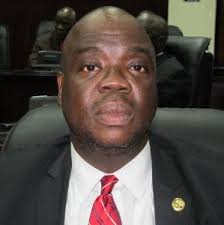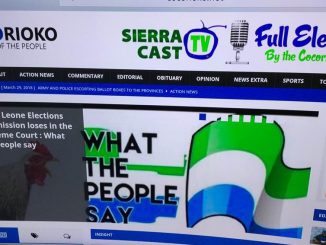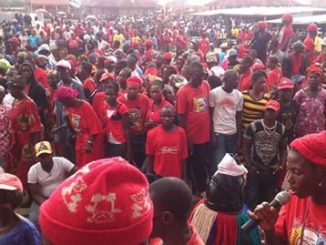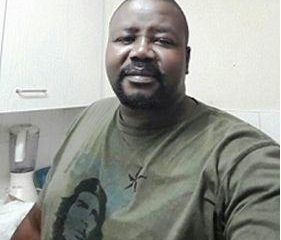
EDWIN SNOWE
Wednesday January 18, 2006
The recent election of Mr. Edwin Snowe , a leading official of the warlord Charles Taylor’s government , as Speaker of the Liberian House of Representatives has provided a lot of eyebrows. Liberia’s exiled journalist, Emmanuel Abaloo , who now lives in the U.S. sent COCORIOKO his impressions of the election.
READ THE ARTICLE BELOW
PIERCING THE VEIL OF SECRECY OF THE ELECTION OF SPEAKER
By Emmanuel Abalo
Liberia’s rebirth of democracy with the inauguration of long time opposition political activist Ms. Ellen John-Sirleaf can be viewed as marred by the “election” a top ally of former President Charles Taylor of as Speaker of the bi-cameral Parliament.
According to news reports, Mr. Edwin Snowe, an ex-son-in-law of former President Charles Taylor, stood as an independent legislative candidate in last year’s polls that ended Liberia’s 14-year civil war. The Speaker, who according to the Liberian Constitution, is third in line to ascendancy of the Presidency.
Mr. Snowe, who is banned by the UN from leaving Liberia because of his past association with Mr. Taylor, has come under increased public scrutiny and allegations as incompetent and one of the most corrupt individual in the Liberian public theater.
The scrutiny and calls for an aggressive “forensic” audit of the Liberia Petroleum Refinery Corporation (LPRC) which the Speaker-elect now heads is led by the Center for Democratic Empowerment (CEDE), a human rights and advocacy consultancy group in Monrovia.
The new Speaker-elect, who laughably, has committed himself to “protecting democracy” during his six-year tenure has denied the allegations of corruption. But he was prevented from attending a recent workshop for newly elected parliamentarians outside Liberia because he is still under the UN travel ban
While under the UN travel ban, Mr. Snowe has continued to maintain telephonic and other contacts with indicted war criminal Charles Taylor. But in defense of his continued shady association with Mr. Taylor, Mr. Snowe is quoted by the Daily Observer newspaper as criticizing the UN for “allowing those who committed excess human rights violations and “killed president to walk about freely.”
Where does Mr. Snowe draw the moral and professional rectitude to “protect democracy” let alone criticize the United Nations? It is quite easy to throw around a catch word like “democracy.”
The outmost concern here is the process of election of the Speaker of Parliament. Credible news reports have indicated that Mr.Snowe, intent on becoming Speaker of the Assembly undertook to “bribe” some of his colleagues for consideration.
In a release issued by the Federation of Nimba Youths and Student Organizations (FENYSO), the students said that incoming legislature must understand that they will be taking “expensive risks if they vote for Mr. Snowe in the wake of mounting concerns and disapproval for his corrupt and exploitative conduct” at the Liberia Petroleum Refining Company (LPRC).
In spite of widespread opposition to his candidature by students, individuals and civic institutions, Mr. Snowe was elected as Speaker by his colleagues. How much money changed hands? Who took what? Who lobbied their other colleagues to switch votes based on “chopping”? What were the qualifications required to be Speaker? Is there a record of a roll call and of votes taken as is mandatory in such proceedings?
There is nothing wrong with the legislative process of “give and take” to get legislative work accomplished. However, when an illegal and criminal action such as bribery taints the process, then an intrusive investigation must be undertaken the law must take its course.
It is obvious that due to the “veil of secrecy” one may never know tainted this process was. But the honorable thing here is for every new Member of Parliament involved in the election of the Speaker to explain to their constituency how and why they voted the way they did. This would signal the first steps of honesty, transparency and accountability by the lawmakers.
The Liberia 1984 constitution, replaced the Liberia 1847 constitution which was suspended on April 12, 1980, following the coup d’etat which overthrew the presidency of H. E. William R. Tolbert, Jr. The process of writing a new constitution began on April 12, 1981, when Dr. Amos Sawyer, a political scientist at the University of Liberia, was appointed chairman of the National Constitution Committee (NCC), the 25-member body that was given the responsibility of drafting a new constitution for Liberia. The NCC completed its work in December 1982, and submitted the draft constitution to the PRC (The People’s Redemption Council) in March 1983. A 59-member Constitutional Advisory Committee (CAA) was then appointed to review the draft constitution. The CAA completed its work on October 19, 1983. On July 3, 1984, the new constitution was submitted to a national referendum and approved.
Under Chapter XI, Article 90, subtitle “Miscellaneous”, it specifically states that,
a. No person, whether elected or appointed to any public office, shall engage in any other activity which shall be against public policy, or constitute conflict of interest.
b. No person holding office shall demand and receive any other perquisites, emoluments or benefits, directly or indirectly, on account of any duty required by Government.
c. The Legislature shall, in pursuance of the above provision, prescribe a Code of Conduct for all public officials and employees, stipulating the acts which constitute conflict of interest or are against public policy, and the penalties for violation thereof.
It goes without saying that every lawmaker and official of the Liberian government must minimally adhere to the Constitution.
In a welcome development, The Interim Transitional Legislative Assembly has mandated the incoming government of Mrs. Sirleaf, in a “binding Resolution”, to hire independent, local and international auditors to audit the incomes and expenditures of the Transitional Government from October 14, 2003 to January 3, 2006.
The Resolution also mandates that Interim Chairman Gyude Bryant, cabinet ministers and heads of public corporations be barred from leaving the country during the period of the audit. Mr. Snowe is an official of the outgoing interim government and must fully submit himself to this audit and not claim legislative immunity.
The big question here then is how relevant and effective can a lame Speaker, saddled with allegations of corruption, incompetence and a UN travel ban, be in the functioning of the Legislative arm of the Liberian Government?
Emmanuel Abalo is an exiled Liberian journalist, media and human rights activist. He is the former Acting President of the Press Union of Liberia (PUL). Mr. Abalo presently resides in Pennsylvania, USA and works as an analyst with CITIGROUP, North America.




Leave a Reply